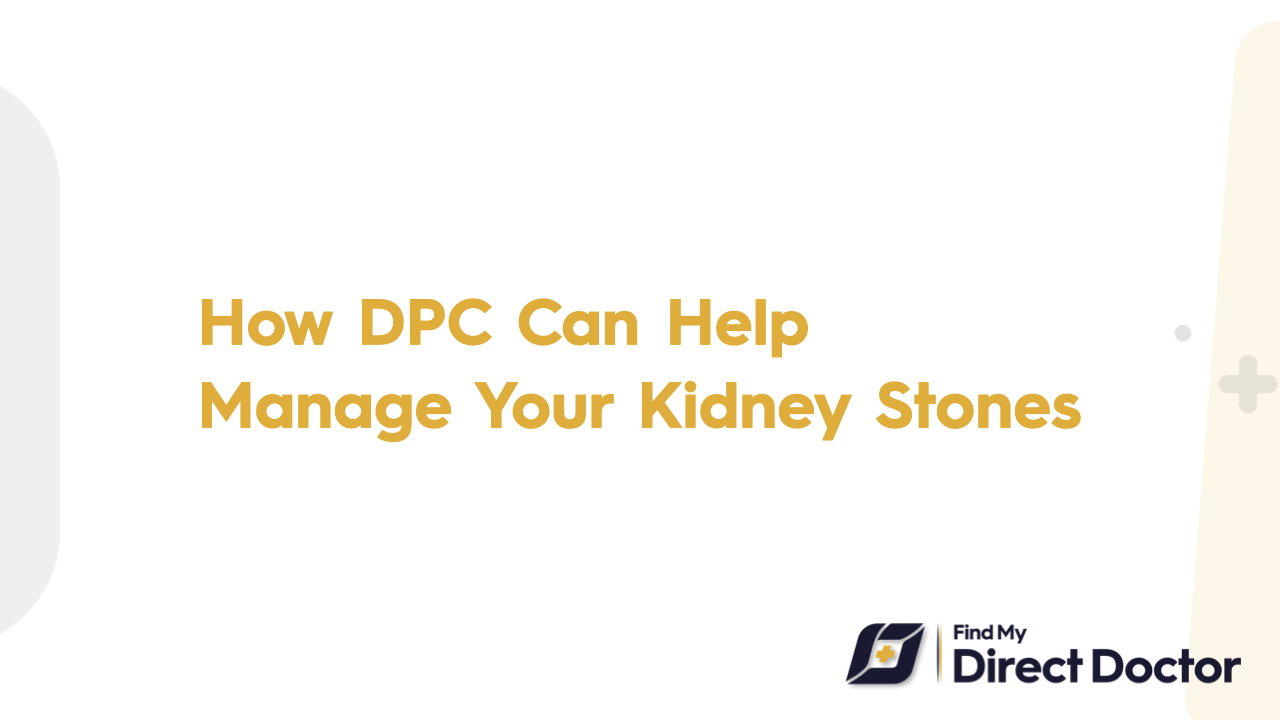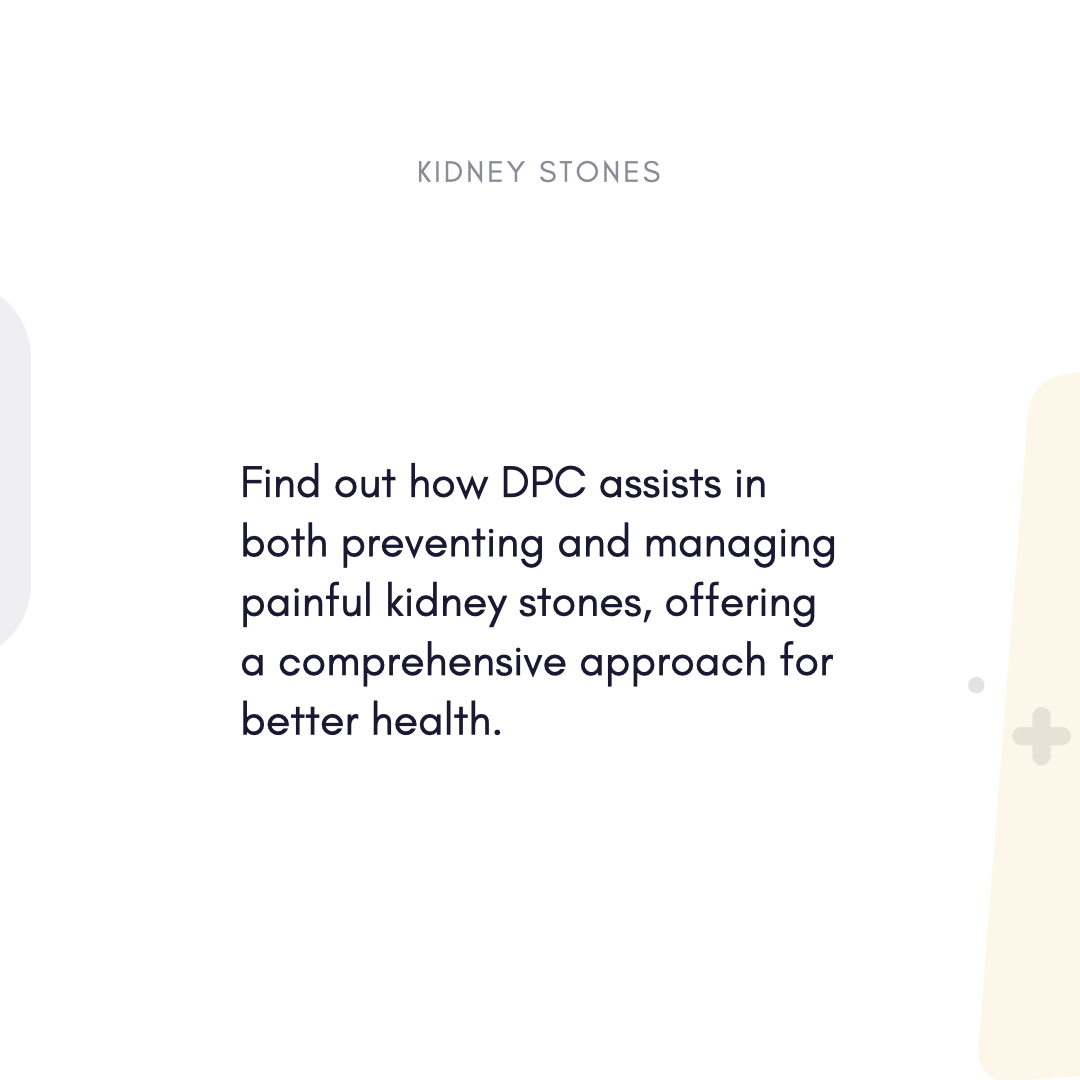Kidney Stones and Direct Primary Care (DPC): Your Path to Proactive, Pain-Free Care
If you have ever experienced the excruciating pain of a kidney stone, sometimes compared to "a hot knife twisting in your back," you understand how critical prevention and relief are. In their lifetime, over 11% of Americans will have a kidney stone; half of them will recur within five years. Beyond the pain, untreated stones risk kidney damage, infections, or expensive ER trips. Offering prevention, affordability, and individualized treatment, Direct Primary Care (DPC) presents hope—a simplified, patient-first method for managing kidney stones.

Knowledge of Kidney Stones
Hardened mineral deposits called kidney stones—calcium, uric acid, struvite, or cystine—form in the kidneys. Symptoms strike quickly and include:
- Extreme flank or groin discomfort.
- Urine with blood tones.
- Frequent nausea and vomiting.
- Painful urination.
- Fever and chills should an infection occur.
Long-term hazards of untreated stones:
- 50% recurrence within five years—common stones.
- Kidney scarring or chronic kidney disease.
- UTIs or sepsis from urinary obstructions.
How DPC Transforms Kidney Stone Management
Under the membership arrangement known as Direct Primary Care (DPC), patients pay a monthly fee—usually USD 50–USD 150—for unlimited access to their doctor. For those with kidney stones, this means no ER waits during crises, no surprise bills, and treatment catered to your stone type and medical background.
Customized Support Anchored in Urology Guidelines
Focusing on American Urological Association (AUA) recommendations, DPC providers offer:
- Stone composition analysis: Reasonably priced 24-hour urine tests or imaging to determine type (e.g., uric acid vs. calcium oxalate).
- Customized diets:
- For calcium stones: Cut sodium.
- For uric acid stones: Reduce purines.
- Boost foods high in citrates.
- Prescription plans: Thiazide diuretics to prevent calcium stones or allopurinol for uric acid stones.
Affordable, Transparent Treatment
DPC clinics lower costs by:
- Same-day imaging: USD 100–USD 300 cash-priced ultrasounds or CT scans to find stones.
- Low-cost medications at near-wholesale pricing: Painkillers (e.g., ketorolac) or alpha-blockers (tamsulosin).
- Preventive focus: Saving USD 5,000+ in ER costs for simple stones.
Continuous Monitoring and Preventive Care
DPC guarantees:
- Hydration tracking: Set custom fluid intake targets—e.g., 3L/day—then follow-up checks.
- Metabolic testing: Frequent urine pH or blood tests to modify prevention strategies.
- Specialist coordination: Seamless, transparent rates for lithotripsy or ureteroscopy referrals.
Main Advantages of DPC for Kidney Stone Sufferers
- Same-day visits for imaging and prescriptions during crises help quickly relieve pain.
- Recurrence prevention: Personalized diets and medications reduce repeat stones by 50–60%.
- Members save USD 1,000+ yearly by avoiding ER visits and insurance mark-ups.
DPC's Customized Stone Management
DPC tailors treatment to your unique needs:
- Lifestyle and diet counseling:
- Oxalate management: Cut back on spinach, nuts, or chocolate for calcium oxalate stones.
- Hydration techniques: Increase fluid intake with citrus drinks or flavored water.
- Sodium limits: Aim for less than 2,300 mg daily to reduce calcium excretion.
- Advanced monitoring:
- Imaging follow-ups: Track stone size and location using low-cost ultrasounds.
- Urine and blood tests: Check citrate, calcium, and oxalate levels to adjust prevention.
- Medication and supplement protocols:
- Potassium citrate supplements to stop calcium stone formation.
- Preventative medications: Allopurinol or thiazides customized to metabolic profiles.
Real-Life Success Stories
- Case 1: Lisa, 42, struggled with recurrent calcium stones. Her DPC doctor prescribed supplements after ordering a 24-hour urine test and discovering low citrate levels. Lisa has gone two years without stones.
- Case 2: Carlos, 55, avoided the ER during a stone crisis with same-day imaging and pain meds from his DPC provider, saving USD 4,000.
Frequently Asked Questions: DPC and Kidney Stones
- Q: Can DPC help prevent future stones?
A: Indeed! DPC stresses hydration, diet, and medications to lower recurrence risk.
- Q: Should I have surgery?
A: Often at negotiated cash rates, DPC doctors arrange referrals to urologists for treatments like lithotripsy.
- Q: Does DPC make sense for stone management?
A: Certainly. Usually for less than daily coffee runs, members save on ER visits, imaging, and drugs.
Why DPC Wins for Kidney Stone Patients
Studies show DPC reduces ER visits by 40% by:
- Timely imaging and pain control during an attack.
- Custom plans using stone type and metabolic testing to prevent errors.
- Holistic prevention addressing diet, hydration, and comorbidities.
Take Charge of Your Kidney Health Right Now
Kidney stones don’t have to derail your life—or drain your savings. With DPC, you have a partner combining urgent care with lifetime prevention—all without insurance hassles.
- DPC helps you crush kidney stones—before they strike.
- Tailored hydration plans and affordable specialist care.
- Financial clarity—no hidden fees or mark-ups.






